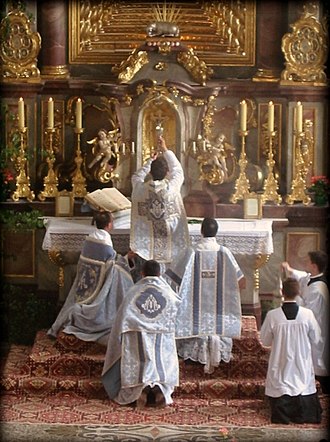Second Vatican Council
Second Vatican Council
The Second Vatican Council, also known as Vatican II, was an ecumenical council of the Roman Catholic Church, convened by Pope John XXIII on 25 October 1962 and concluded by Pope Paul VI on 8 December 1965. It was the twenty-first ecumenical council of the Catholic Church and the second to be held at St. Peter's Basilica in the Vatican. The council, through its decrees and declarations, sought to address relations between the Roman Catholic Church and the modern world. It became one of the most significant events in the history of the Roman Catholic Church, promoting renewal and reform.
Background
The idea for a council was announced by Pope John XXIII on 25 January 1959, as a means for spiritual renewal of the Church and as an opportunity to seek unity among Christians, including efforts towards dialogue with other religions. The preparation for the council took several years, and over 2,500 bishops from around the world participated in its sessions.
Sessions and Documents
Vatican II was held over four sessions from 1962 to 1965. It produced sixteen major documents, which can be categorized into constitutions, decrees, and declarations. These documents addressed various aspects of church doctrine, liturgy, and administrative practices, marking a significant shift in ecclesiastical approach and theology.
Key Documents
- Sacrosanctum Concilium (Constitution on the Sacred Liturgy): Promoted liturgical reform, including the use of vernacular languages in the Mass instead of Latin.
- Lumen Gentium (Dogmatic Constitution on the Church): Defined the Church as the "People of God" and expanded the understanding of the roles of bishops and laity.
- Dei Verbum (Dogmatic Constitution on Divine Revelation): Emphasized the importance of Scripture alongside Tradition.
- Gaudium et Spes (Pastoral Constitution on the Church in the Modern World): Addressed the role of the Church in contemporary society, focusing on issues like peace, social justice, and the dignity of human life.
Impact
The council's impact was wide-ranging, influencing not only internal Church practices and approaches to worship but also the Church's relationship with other Christian denominations, non-Christian religions, and the broader world. It led to a new openness and dialogue with other faiths, particularly Judaism, and a reevaluation of the Church's stance towards the modern world.
Controversies and Interpretations
The interpretations of Vatican II's teachings have been a source of debate within the Church. Some view the council as a break from the past, while others see it as a continuation of Church tradition. The discussions around the council's legacy continue to shape Catholic thought and practice.
Legacy
The Second Vatican Council remains a pivotal point in the history of the Roman Catholic Church, symbolizing a moment of renewal and adaptation. Its documents and decisions continue to influence the direction of the Church and its engagement with the world.
This article is a Christianity-related stub. You can help WikiMD by expanding it!
Transform your life with W8MD's budget GLP-1 injections from $125.
W8MD offers a medical weight loss program to lose weight in Philadelphia. Our physician-supervised medical weight loss provides:
- Most insurances accepted or discounted self-pay rates. We will obtain insurance prior authorizations if needed.
- Generic GLP1 weight loss injections from $125 for the starting dose.
- Also offer prescription weight loss medications including Phentermine, Qsymia, Diethylpropion, Contrave etc.
NYC weight loss doctor appointments
Start your NYC weight loss journey today at our NYC medical weight loss and Philadelphia medical weight loss clinics.
- Call 718-946-5500 to lose weight in NYC or for medical weight loss in Philadelphia 215-676-2334.
- Tags:NYC medical weight loss, Philadelphia lose weight Zepbound NYC, Budget GLP1 weight loss injections, Wegovy Philadelphia, Wegovy NYC, Philadelphia medical weight loss, Brookly weight loss and Wegovy NYC
|
WikiMD's Wellness Encyclopedia |
| Let Food Be Thy Medicine Medicine Thy Food - Hippocrates |
Medical Disclaimer: WikiMD is not a substitute for professional medical advice. The information on WikiMD is provided as an information resource only, may be incorrect, outdated or misleading, and is not to be used or relied on for any diagnostic or treatment purposes. Please consult your health care provider before making any healthcare decisions or for guidance about a specific medical condition. WikiMD expressly disclaims responsibility, and shall have no liability, for any damages, loss, injury, or liability whatsoever suffered as a result of your reliance on the information contained in this site. By visiting this site you agree to the foregoing terms and conditions, which may from time to time be changed or supplemented by WikiMD. If you do not agree to the foregoing terms and conditions, you should not enter or use this site. See full disclaimer.
Credits:Most images are courtesy of Wikimedia commons, and templates, categories Wikipedia, licensed under CC BY SA or similar.
Contributors: Prab R. Tumpati, MD






